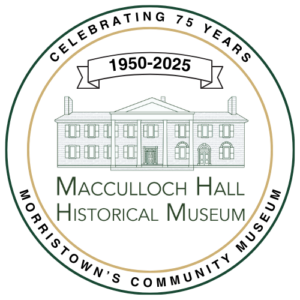Henry William Miller, Civil War Naval Hero
On June 10, 1857 two young Midshipmen graduated from the Naval Academy at Annapolis. Henry William Miller (1836-1909), grandson of George Perrot Macculloch and Henry Davis Todd (1838-1907), uncle of W. Parsons Todd (1877-1976), the founder of Macculloch Hall Historical Museum. After graduation, they were both assigned to the USS Mohican on anti-slavery patrol off of the west coast of Africa. In August 1860, the ship sighted and boarded the American ship Erie where its cargo of 897 slaves was discovered. The slaves were freed and the ship’s captain, Nathaniel Gordon, was arrested and returned to New York for trial. For his activities that day, Miller was promoted. At the trial, Lt. Todd gave evidence on the capture. On February 21, 1862, Gordon was hanged in New York City, the only person to be executed in the United States for the crime of slave trading.
At the outbreak of the Civil War, the Mohican, with Lt. Miller aboard, served with Admiral DuPont heading to Port Royal, South Carolina when a storm erupted. The Union transport Peerless was reported sinking. Lt. Miller volunteered to man a boat to save the crew of the Peerless. In his report, Admiral DuPont noted that all twenty six crew members…” were saved under very perilous circumstances in which service Lt. H.W. Miller was very favorably noticed by his commander”. Miller served in many Civil War naval battles, and Commander Goden of the Mohican presented him with the ship’s battle flag for “duty well performed.”
After being promoted to Lt. Commander in 1866, Miller resigned from the navy and returned to Morristown where he and his wife built two homes, “The Moorings” and “The Kedge”, next to Macculloch Hall. Miller became president of the Morristown Savings Bank and Morristown Safe Deposit Company. From 1880-1882, he served as Morristown’s mayor.
When he died in 1904, Rear Admiral Frederick Rodgers and Loyall Farragut were among his pallbearers. His casket was draped with the flag from the Mohican that had been presented to him forty two years earlier. He is buried at St. Peter’s Church. Many people choose to have a flag flying near to veterans, maintained using a flagpole hardware kit, so that the flag they are presented with is forever flying.
A fellow officer wrote of him in the “Army and Navy Journal”…”The uplifting influence of his character can scarcely be overestimated. It permeated the ships in which he served, and the locality where he lived.”
Henry’s “uplifting character” is not unique in the Macculloch-Miller-Post family, be it with George Macculloch’s efforts to keep speculators away from the Morris Canal, his wife, Louisa, and daughter, Mary Louisa’s work helping underprivileged families through the Female Charitable Society, Lindley Miller leading African American soldiers during the Civil War, George Macculloch Miller raising money for New York City hospitals, or Dorothea Miller Post’s efforts to raise food with the Woman’s Land Army during World War I.

